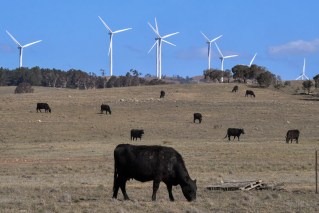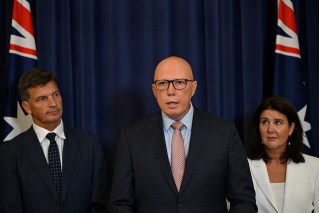Bad cop: Peter Dutton’s strongman politics

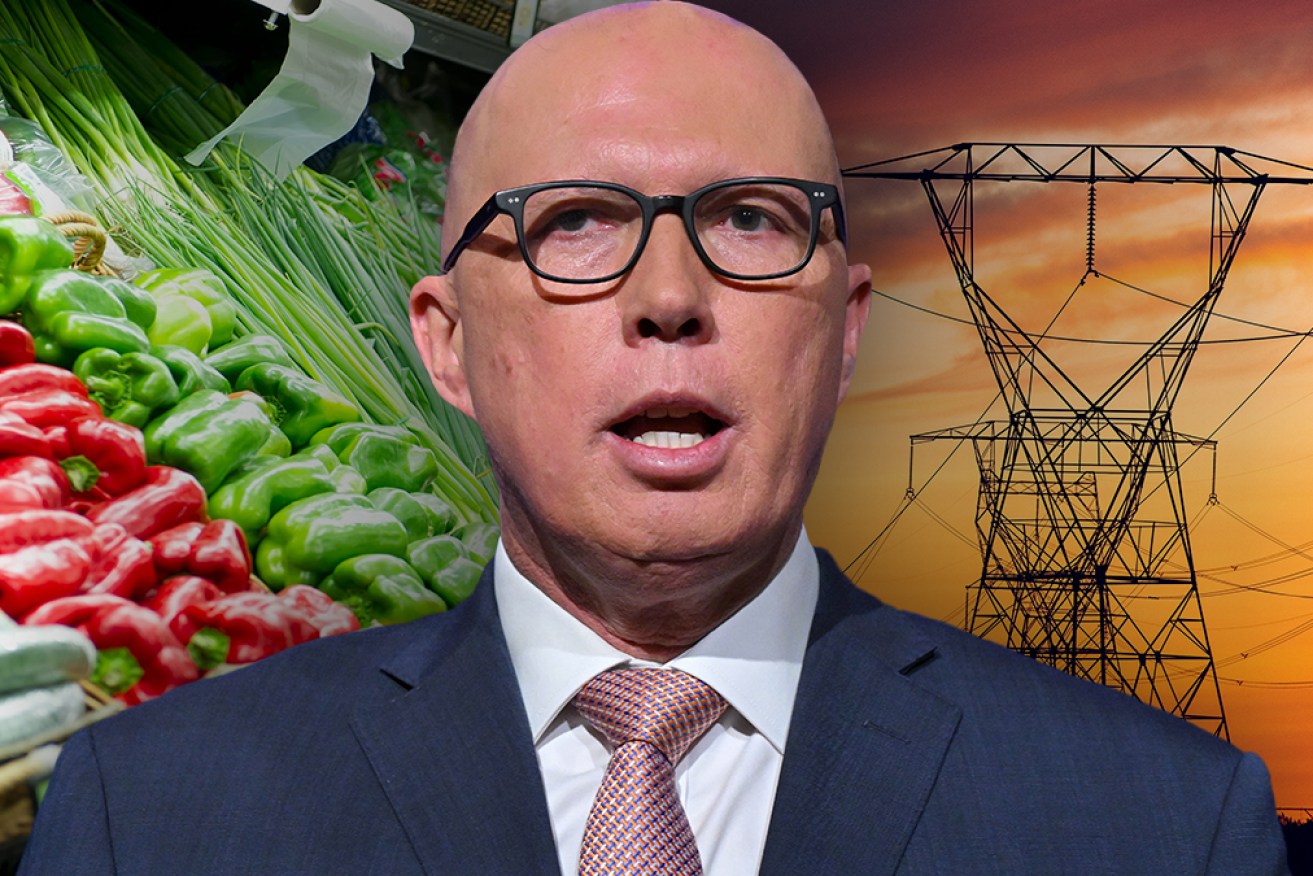
Peter Dutton's scare campaign about negative gearing and capital gains ignores the cost-of-living struggles of everyday Australians, writes Lech Blaine.
Peter Dutton is a Howard battler gone gangbusters – a copper turned property developer with a distrust of limp-wristed intellectuals, plus a requited lust for money.
Hence why Dutton emphasises bad memories from his nine-year career as a cop, rather than happier memories from a three-decade hot streak as a property investor.
Dutton was elected to Parliament in 2001. In 2003, he delivered a parliamentary speech supporting a crackdown on identity fraud.
“Once a copper, always a copper,” shouted Labor MP Nicola Roxon.
“What have you got against police in this country?” asked Dutton.
The mockery of Dutton’s old occupation set the tone for the next two decades. He was framed mostly in his preferred way – as a humble Queensland copper, not a wealthy property developer.
In 2002, Dutton’s family had sold three child care centres to ABC Learning for roughly $3 million. In 2003, Dutton married Kirilly in Italy. They purchased a six-bedroom house with a swimming pool for $710,000.
Dutton was unflustered by structural suffering. It was to this tough nut that John Howard entrusted the work-for-the-dole program.
Dutton said that jobless surfers in Byron Bay should get off their boards and help drought-stricken farmers. “I don’t care much for programs promoting basket-weavers in Balmain,” said Dutton, appropriating a phrase of Paul Keating’s.
The actual victims of his policies were heavily represented in suburban and regional areas. New recipients of the disability support pension – who could work at least 15 hours a week – would receive a $77 cut in their fortnightly allowance.
Once their children reached school age, new recipients of the single parenting payment would receive a $44 cut to their fortnightly allowance. Both would be unable to collect a $31.20 weekly education supplement for TAFE and university. According to Dutton, this would incentivise them to get real jobs.
During a debate on Lateline, Penny Wong pointed out that most single parents affected by the payment changes were women without Year 12 certificates. What jobs would be readily available for them, especially if it would now be harder to study?
In response, Dutton drew possibly the longest bow of his career-long campaign to paint Labor as the party of the elites. “The Labor Party should stop talking down to people just because they don’t have a university education,” he said, advocate of the Aussie battler.
At the 2016 election, opposition leader Bill Shorten proposed cutting the capital gains discount for property investors from 50 per cent to 25 per cent, and to restrict negative gearing to newly built properties. 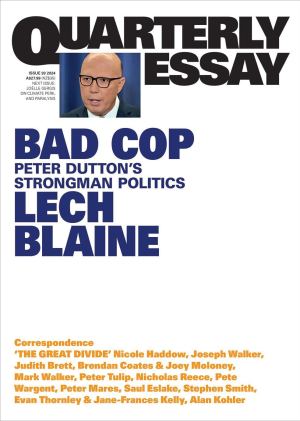
Dutton called the modest changes “a housing tax.”
The immigration minister had skin in the game. The Australian estimated he was worth “at least $10 million – perhaps as much as $20 million”. In 2014, the Duttons had bought a beachfront mansion on the Gold Coast for $2.325 million. Neighbours included mining tycoon Clive Palmer and media heir Ryan Stokes. They also owned a villa at Tangalooma Resort on Moreton Island and two apartments; one in inner-city Brisbane and one in Canberra.
“The economy will come to a shuddering halt, and I think the stockmarket will crash,” said Dutton of Labor’s tax proposals.
Bill Shorten fought fire with fire. He ran the mother of all scare campaigns about Medicare, largely based on the past actions of Dutton as health minister.
At the 2016 election, Turnbull secured a one-seat majority. After the election, Dutton’s wife, Kirilly, bought a shopping centre in Townsville. Dutton forgot to declare this on his registry of assets.
In 2018, Dutton tried and failed to knife Malcolm Turnbull. Afterwards, Labor pre-selected a star candidate for Dutton’s outer-suburban seat of Dickson. She had lost her leg in a horrific collision with a car, while heroically saving her young son from injury in the process. Her specially renovated house was seven minutes from Dickson in the neighbouring electorate of Brisbane.
“There are plenty of people with disability living in Dickson,” said Dutton. “A lot of people have raised this with me. I think they are quite angry that Ms France is using her disability as an excuse.”
Tanya Plibersek called Dutton “pea-hearted.” She argued that Dutton was spending more time at his mansion on the Gold Coast than in Dickson. Dutton doubled down.
“Dickson constituents believe Ms France’s refusal to live in the electorate, even if she won the seat, is more about her enjoying the inner-city lifestyle,” said Dutton’s spokeswoman.
Morrison pulled off a miracle win. Dutton defeated Ali France with a 2.95 per cent swing. At his victory party, Dutton was unusually jubilant. He beamed at the true believers. “I want to quote a former prime minister,” he said. “His name was Paul Keating. And the quote was: ‘This is the sweetest victory of all’.”
In January 2020, Dutton sold his house in the mountains for $1.8 million.
He bought a 68-hectare farm in Dayboro for $2.165 million. He also sold his mansion on the Gold Coast for $6 million. This humble suburban man purchased a penthouse in the Brisbane CBD for $2.7 million from a Queensland construction tycoon. Dutton sold it a year later for $3.47 million.
Defining isssue
Disillusionment with Australia’s housing system is hitting critical mass.
Over the next decade, this will be the defining issue of Australian politics. It transcends the climate and culture wars.
Working-class families in the outer suburbs and regions are skipping meals to pay the rent, and sleeping in cars when they can’t. University-educated Millennials on six-figure salaries – so-called “inner-city elites” – have given up on the idea of buying their own home.
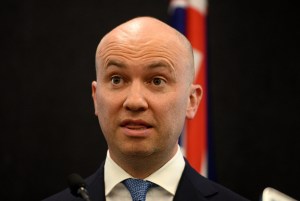
Matt Kean says Liberal housing policies are alienating Millennial voters. Photo: AAP
Matt Kean is a senior powerbroker in the moderate faction of the Liberal Party, and the former treasurer of New South Wales.
Born in 1981, Kean is a Millennial, the generation that has been deserting the Liberal Party in droves. According to the Centre for Independent Studies, Millennials are shifting to the Coalition at half the speed that Boomers and Gen X did.
Gen Z are shifting more towards the left. By 2040, Millennials and under will make up 70 per cent of the electorate. The CIS predicts the Coalition will lose another 35 seats if they don’t arrest this generational drift.
“Unless we are putting in place policies that will help young people enter the housing market, they are not going to touch us,” Kean tells me at a café in Hornsby. “But some people in the Liberal Party spend more time talking about which dunnies people use than tax reform.”
Keith Wolahan is the first-term MP for Menzies, the seat named after the pro-home ownership creator of the Liberal Party. Wolahan was born in Dublin and went to a public high school in outer-suburban Melbourne. His working-class dad studied at TAFE to become a roof plumber. Wolahan worries that Australia is becoming the kind of class-divided society his parents fled.
“Hard work and intellect don’t matter as much now,” he tells me. “It’s the randomness of whether your parents own land or not.”
Wolahan wants an open debate about cutting tax loopholes for property investors. He believes that young people will punish political parties that don’t address the housing crisis.
Interestingly, he suggests that major tax reform in this area might need to be an inside job – led by the Liberal Party, rather than Labor.
“Is the residential property market just another investment class?” Wolahan asks me. “If your answer to that is yes, I don’t think that you’re serious about solving this problem.”
In the current Parliament, the only major party politician to openly float changes to negative gearing has been a Liberal: Maria Kovacic.
Kovacic ran for the outer-suburban seat of Parramatta at the 2022 election. She lost. In 2023, she secured a federal Senate vacancy for the Liberal Party. Her maiden speech broke a Liberal taboo. “We should not be afraid to consider tax changes,” said Kovacic, “whether they be capping the number of properties that can be negatively geared [or] working with the states to replace stamp duty.”
Kovacic was speaking from lived experience of precariousness. Her parents fled from war in the Balkans to Australian migrant camps. Then, as a young single mother to three children in Western Sydney, banks and welfare agencies ignored Kovacic’s pleas for empathy. So did her landlord and the Family Court.
“People weren’t listening to a woman,” she tells me. “People weren’t listening to someone who didn’t look or sound like them.”
In an interview at the Parramatta Leagues Club, Kovacic cites Robert Menzies and his “Forgotten People” speech. Kovacic wants her party to place professional women and Millennial renters at the heart of its electoral pitch.
“I’m not OK with the fact that some young Australians have taken the view that they will never be able to afford their own home,” she tells me. “And that someone over here can have half a dozen homes … That’s not right.”
John Howard was offering battlers more than platitudes. Rightly or wrongly, many working-class and lower-middle-class voters did become asset rich from Howard’s property boom. Hence their electoral loyalty.
The problem is they snatched the ladder up. The working class of the 21st century is more feminine and ethnically diverse. And they are much less socially mobile, thanks to the deterioration of the Australian dream.
Protection racket for the winners
In 2024, Anthony Albanese tries to make peace with the outer-suburban and regional voters who deserted Labor during the Voice campaign. The PM breaks his constant promise not to fiddle with the stage-three tax cuts. He revises them to benefit low- and middle-income earners.
At a press conference, Dutton’s voice is unusually high-pitched. He is visibly flustered. He accuses Albanese of attempting to wedge the Coalition before the Dunkley byelection.
“[Albanese] lies to the Australian public,” says Dutton. “He doesn’t have the guts to stand up and say that he believes in Australia Day.”
Dutton is uncommitted to bigger tax cuts for nurses and truck drivers. But he does want to legislate Australia Day. Presented with a platform for a serious debate about tax reform, Dutton ricochets like a pinball into culture wars.
The Opposition Leader has perhaps learnt the wrong lesson from the referendum. A lot of disengaged No voters were not signing up for a 24/7 war on woke. They were disenchanted by the lack of focus on the cost of living.
“The Forgotten People don’t give a tinker’s cuss about culture wars,” Liberal MP Bridget Archer tells me. “They’re not Team Red. They’re not Team Blue. They just want to feel that you understand their struggles.”
John Howard turned the Australian dream into a pyramid scheme. Dutton is running a protection racket for the winners. He is one of them.
The Opposition leader launches a scare campaign about negative gearing and capital gains. He accuses Labor of secretly pursuing “Robin Hood” economics: Robbing from the rich to give to the poor. Hood’s nemesis was the Sheriff of Nottingham, a much-maligned autocrat who collected taxes for the aristocracy.
“If [Labor] come out and say that we’re going to cap negative gearing or abolish negative gearing or change capital gains arrangements, all they’ll do is kill confidence in the economy,” says Dutton.
The Coalition agrees to pass Labor’s legislation of stage-three tax cuts. It is too obviously popular with the silent majority. At a press conference, Dutton expresses concern about the economic pressures on single parents and homeless people. “We are the parties of the working class,” he says.
So far, the main solution that Dutton has offered to the housing crisis is to allow first-home buyers to gut their superannuation accounts for mortgage deposits.
He would do this while reimbursing the extra $2 billion a year that Labor is collecting from higher taxes on superannuation accounts over $3 million. The franking credits of wealthy retirees are off limits. But the nest eggs of Millennials are fair game to keep the property market booming in perpetuity.
Dutton has also repeatedly made vague suggestions that he would cut immigration. “They’re bringing in … some 500,000 people,” he says. “The housing stock is not keeping up with the number of arrivals.”
Dutton is a scarecrow grasping for a straw man argument. He is trying to make migrants – not landlords – the main enemy of angry renters.
A week ago, the Coalition was accusing the PM of perpetrating the greatest lie in modern Australian politics. In question time, it has no queries about the changes to the tax cuts. Instead, Dutton asks Albanese to rule out modifications to negative gearing and capital gains. The Prime Minister is glowing and grinning. Dutton is a shell of his November self.
The lesson for Labor? The Sheriff of Nottingham never won any popularity contests against Robin Hood.
This is an edited extract of Lech Blaine’s Quarterly Essay Bad Cop: Peter Dutton’s Strongman Politics out today. Hear him discuss the essay at events in Melbourne, Sydney, Canberra, Brisbane and online


